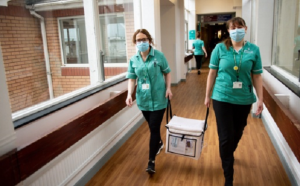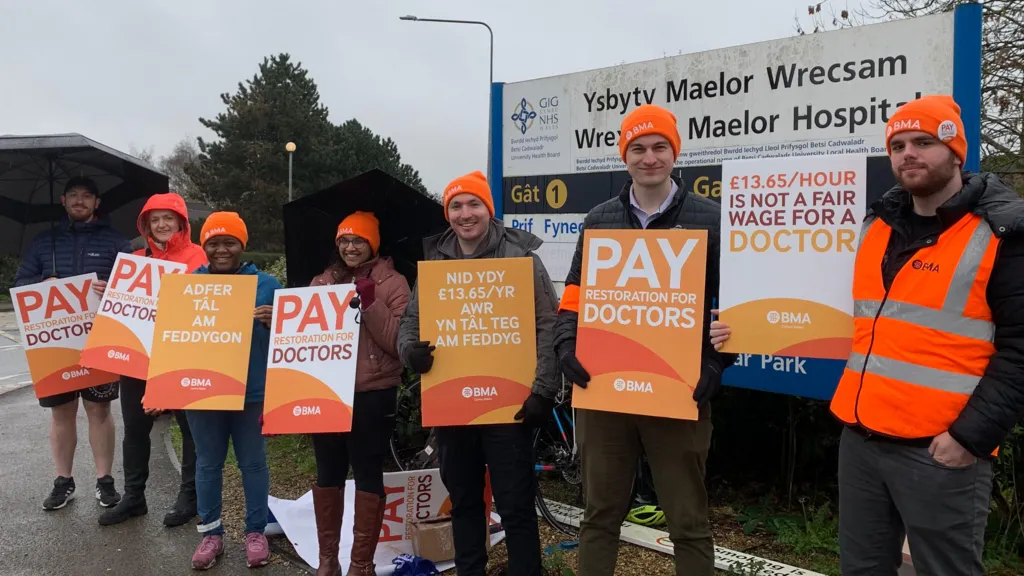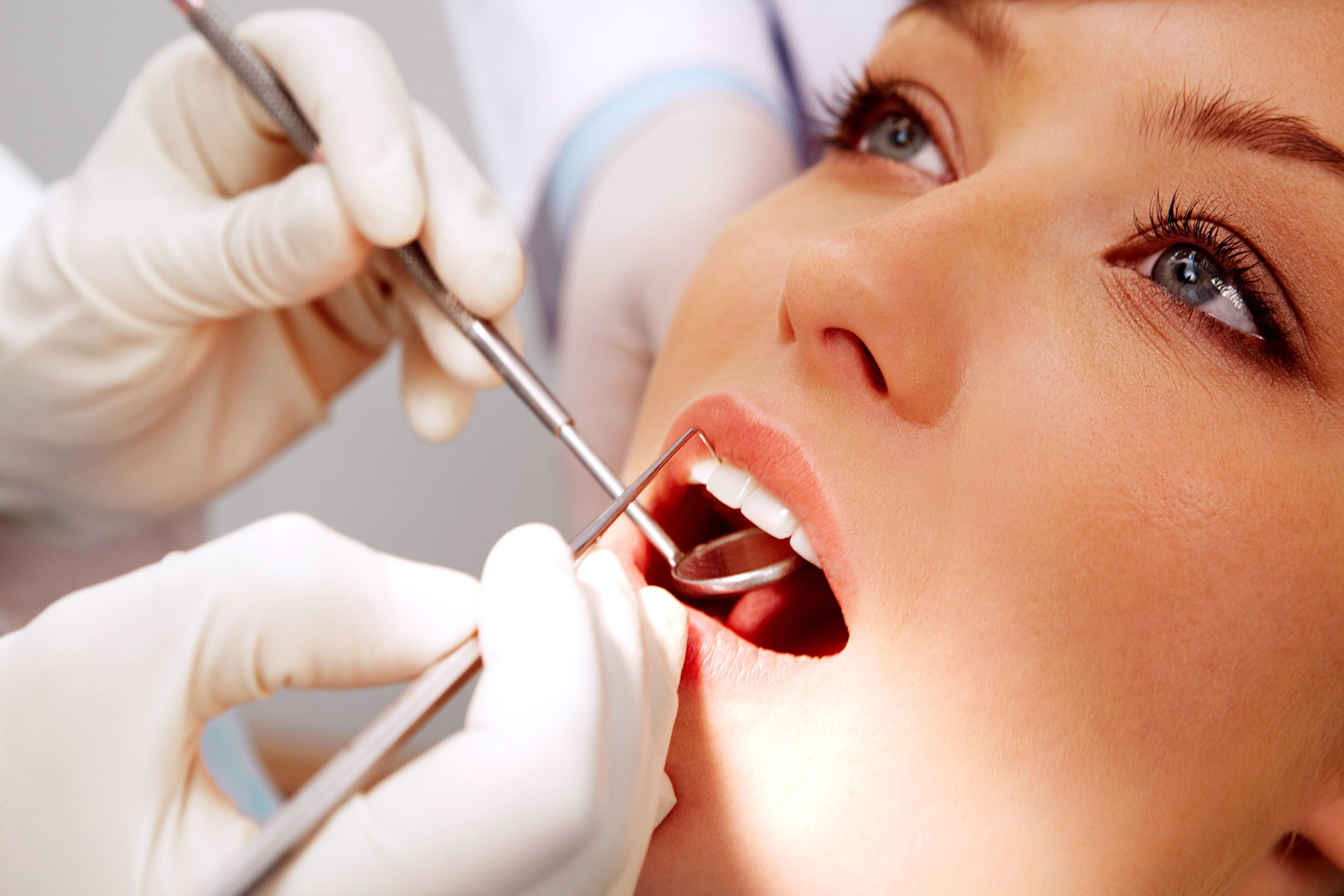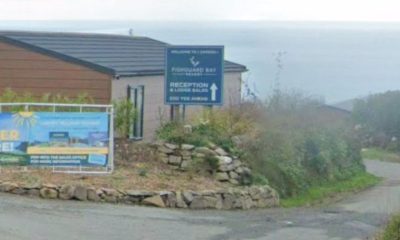Health
New Covid vaccine arrives first in West Wales


HEALTH BOARD ‘DELIGHTED’
The Medicines and Healthcare Products Regulatory Agency (MHRA) authorised the Moderna vaccine as safe and effective in January 2021 following rigorous clinical trials.
Moderna is the third Covid-19 vaccine distributed in the UK.
Two other vaccines, the Pfizer vaccine and the Astra Zeneca vaccine, are already in use across the UK. 31 million people across the UK have received their first shot of one of those vaccines since the inoculation programme began in December last year.
Supplies arrived in Wales on Tuesday, April 6.
5,000 doses were delivered to vaccination centres in the Hywel Dda University Health Board area.
The Moderna vaccine is a two-dose vaccine given at an interval of between four and twelve weeks.
Ros Jervis, Director of Public Health for Hywel Dda University Health Board, added: “We’re delighted to be able to use the Moderna vaccine for deployment across west Wales.
“We will be using this new vaccine, alongside Oxford Astra-Zeneca, to continue the immunisation’s roll out to our communities in Carmarthenshire, Ceredigion and Pembrokeshire.
“We are incredibly lucky to have a third vaccine in Wales, with a long shelf life and the ability to be easily transported, to help deliver the vaccination programme to small clinics across our rural communities.”
THE MODERNA VACCINE EXPLAINED
The Moderna vaccine does not contain the virus to produce immunity.
It cannot give you COVID-19.
The injection stimulates the body’s natural defences (immune system). It works by making the body produce its own protection (antibodies) against the virus that causes the COVID-19 infection.
The vaccine delivers the ‘instructions’ that cells in the body can use to make antibodies to fight the virus that causes COVID-19.
As with any vaccine, Moderna may not fully protect all those who receive it. Those who get it may not be fully protected until two weeks after the vaccine’s second dose.
In trials, the vaccine was 94.1% effective in preventing Covid-19 infection in patients with no prior history of the disease. It was 100% effective in preventing patients from developing the severe Covid-19 symptoms that lead to hospitalisation.
Although the Moderna vaccine is the priciest of the vaccines yet rolled out, it has an advantage over the Pfizer vaccine. It can be stored in a regular fridge for up to fourteen days after its delivery to a vaccination centre.
It contains no ingredient derived from animals.
A KEY MILESTONE
Health Minister Vaughan Gething said: “This is another key milestone in our fight against the COVID-19 pandemic. The third vaccine for use in Wales significantly adds to our defences in the face of coronavirus. It will help to protect our most vulnerable.
“Every vaccine given to someone in Wales is a small victory against the virus, and we would encourage everyone to go for their vaccine when invited.
“If people cannot attend their appointment, we ask them to let the health board know via the contact details provided in their invitation as this vaccination slot can be offered to someone else rather than be wasted.
“Once you have been vaccinated, you should continue to follow guidance, staying two metres apart, washing your hands and wearing a face covering to protect those around you.
“I want to thank all those who have been working tirelessly to deliver the vaccine across Wales and help us meet our second milestone of offering a vaccine to all phase one priority groups. I also want to thank the 1.5 million people in Wales that have already come forward for their vaccine and done their bit in this national effort.”
Welsh Conservative deputy health spokesperson and candidate for Ceredigion and Mid and West Wales, Amanda Jenner, said: “The Conservative UK Government’s decision to go it alone has been fully vindicated with the phenomenal results of the British vaccination programme.
“The roll-out of the Moderna vaccine, administered by our outstanding NHS and volunteers, will boost our ability to protect Welsh people and restore our freedoms.”

VACCINE SUPPLIES
Starting from the middle of last year, the UK Government secured a deliberate oversupply of vaccine to ensure continuity of supply.
As part of that strategy, the Department of Health placed provisional orders – pending approval by the medicines’ regulator – of seven different vaccines in different stages of development.
The UK has ordered 40 million doses of Pfizer’s vaccine, 100 million doses of the Oxford vaccine, and 17 million doses from Moderna.
A further four vaccines are either in clinical trials or awaiting MHRA approval: Novavax (60 million doses, Janssen (30 million doses), Valneva (60 million doses), GlaskoSmithKline (60 million doses).
The number of Covid-19 vaccine doses on order is enough to fully inoculate the UK’s entire population twice.
We will have offered a first dose of the vaccine to all those in priority groups 5-9 by Sunday 18 April.
To ensure no one is left behind, this week the health board has launched an appeal asking people in groups 1 to 9 who have not been contacted to get in touch to arrange their first vaccine dose.
If one or more of the following applies to you and you have not received your first vaccine appointment, please contact the health board on 0300 303 8322 or by email [email protected].
- are aged 50 or over
- are aged 16 to 64 and have underlying health conditions that put you at increased risk of COVID-19 mortality
- work in a care home or in health and social care in Carmarthenshire, Ceredigion or Pembrokeshire
- are the primary unpaid carer of an elderly or disabled adult who is at increased risk of COVID-19 mortality, or a child with severe neuro-disabilities
THE SECOND DOSE
Second doses are essential for longer-term protection, so it’s important that everyone comes forward for their full course when called.
When you will be contacted for your second vaccine dose depends on which vaccine you have received.
We are asking anyone who received the Pfizer vaccine and has not received a second vaccine appointment yet, to get in touch as soon as possible on 0300 303 8322. Please note our phone lines get very busy at times and you may have to wait for the call to be answered. You can also contact us by emailing your name and contact phone number to [email protected].
The health board aims to complete all second Pfizer vaccine doses by week commencing Monday 12 April.
To check which vaccine you received, look at the card given to you when you received your first vaccine. It will say if you received either the Pfizer BioNtech vaccine or the Oxford AstraZeneca vaccine.
If you received a first vaccine dose of the Oxford AstraZeneca vaccine, we politely ask that you do not contact your GP practice or health board at this time to ask about a second vaccine appointment. You will be contacted when it is your turn for a second dose – we are calling those who received a Pfizer first dose at this time.
Care home residents, people aged over 80 and all other priority groups who have received the Oxford AstraZeneca vaccine at the GP surgery will be contacted between 11 to 12 weeks following their first vaccine with an appointment time.
Confidence is building around the effectiveness of the vaccines.
UK and EU regulators have also been very clear about the safety of the vaccines. The benefits of vaccination far outweigh any possible risks.
Health
Doctors to enter pay negotiations with the Welsh Government

BMA CYMRU Wales has suspended forthcoming industrial action for Consultants and SAS doctors following a constructive meeting with the Welsh government to resolve its pay disputes.
As a result of sustained pressure, including three rounds of industrial action by junior doctors in Wales, the Welsh Government has made a significant proposal to form the basis of talks to end the pay disputes with all secondary care doctors including Consultants, SAS and Junior doctors.
Since the meeting last week, the committees representing doctors from all three branches of practice have voted to enter pay negotiations based on this proposal.
The planned 48-hour strike by Consultants and SAS doctors due to take place from 16 April will now be suspended.
Junior doctors have paused plans to announce more strike dates whilst they enter negotiations with the Welsh Government.
The Welsh junior doctors committee, Welsh SAS committee and Welsh consultants committee will now each engage in pay negotiations, with the aim of reaching deals which can be taken separately to their respective members.
Dr Oba Babs Osibodu and Dr Peter Fahey co-chairs of the BMA’s Welsh Junior doctors Committee said:
“This is a significant step forward. It is sad that we had to take industrial action to get here, but we are proud of members for demonstrating their resolve in pursuit of a fair deal for the profession.
“Whilst we are optimistic and hope to quickly resolve our dispute, we remain steadfast in achieving pay restoration. Until we reach a deal, nothing is off the table.
“We will continue to work hard to reach an offer that is credible to put to members who will ultimately have the final say.”
Dr Stephen Kelly, chair of BMA Cymru Wales’ Consultants committee said:
“The Welsh Government’s recent efforts to reach an end to the pay dispute are encouraging and so we have called off our planned strike for now whilst we allow time and space for negotiations to take place.
“We’re hopeful that we can reach a deal that sufficiently addresses years of erosion to our pay to help retain senior doctors in Wales but remain ready to strike if we’re not able to do so during negotiations.”
Dr Ali Nazir, chair of BMA Cymru Wales’ SAS doctor committee said:
“As a committee, we felt that this latest development goes someway to understanding the strength of feeling of our members. We will work hard to reach a settlement that sufficiently meets the expectation of our colleagues who have faced real terms pay cuts of up to a third since 2008/9.”
In August last year, the BMA’s committees representing secondary care doctors in Wales voted to enter into separate trade disputes with the Welsh Government after being offered another below inflation pay uplift of just 5% for the 23/24 financial year. SAS doctors on some contracts were offered as little as 1.5%. This was the lowest pay offer any government in the UK offered and less than the DDRB, the pay review body for doctors and dentists, recommended last year.
As part of their disputes, SAS doctors, consultants and junior doctors carried out successful ballots for industrial action. Since then, junior doctors have taken part in 10 days of industrial action since January this year.
Health
BMA pay disputes – Junior Doctors, Consultants and Specialist Doctors

THE WELSH Government and BMA Wales’ three national committees representing consultants, SAS doctors and junior doctors have today agreed to formal negotiations about pay.
Planned industrial action will be suspended during the negotiations.
A mandate is being developed for the talks with all three BMA branches of practice with the aim of resolving the disputes over pay for 2023-24.
In the context of the most challenging financial position the Welsh Government has faced since devolution, a significant amount of work has been undertaken to identify funding to support the negotiations.
First Minister Vaughan Gething said: “We recognise the strength of feeling among BMA members and that industrial action is never taken lightly.
“This is a government that listens and engages to find solutions. I prioritised a meeting with the BMA directly alongside the Cabinet Secretary for Health to reinforce our commitment to that partnership approach.
“We currently face the most severe financial situation in the devolution era which makes our task far harder. Despite this backdrop, we have worked to identify a way forward that I hope will lead to the successful resolution of this dispute and ensure that doctors can return to work in NHS Wales.”
Cabinet Secretary for Health Eluned Morgan added: “Even in these very challenging circumstances, we have worked in social partnership with the BMA and NHS to maintain patent safety during industrial action.
“But the strikes have been very disruptive to the delivery of NHS services – none of us want to see doctors on strike. I am pleased the three BMA committees have agreed to pause further industrial action and begin formal talks with Welsh Government and hope we can bring an end to this dispute.”
Health
NHS dental charges in Wales to increase from April

THE COST of NHS dental treatment in Wales will increase from 1 April 2024.
The increase in dental charges is the first since April 2020 and are overall still lower than in England. Any revenue generated from the increased charges will be re-invested back into NHS dentistry services.
From April 2024, the three standard charges will increase to between £20.00 and £260.00 depending on the treatment required, and urgent treatment will increase to £30.00.
Around 50% of people receive NHS dental treatment for free in Wales. Those eligible for free treatment include children under 18 or those aged 18 and in full time education, pregnant women or those who have had a baby within the 12 months of treatment starting, anyone who has dentistry treatment carried out in a hospital or people on certain benefits.
Additionally, the low-income scheme provides full or partial help with health costs, depending on individual circumstances.
Despite pressure on budgets the Welsh Government has increased investment for dentistry, with funding £27 million higher than it was in 2018 to 2019. Included within this increase is an additional £2 million a year to address local access issues.
Changes to the dentistry contract in Wales include a requirement for NHS practices to see new patients. Since this was introduce in April 2022, 312,000 people who couldn’t get an appointment before have now received NHS dental treatment.
Cabinet Secretary for Health and Social Care, Eluned Morgan, said: “Because of the extreme pressure on our budget we have had to consider if additional funding should be raised by increasing dentistry charges.
“This is the first increase we have made to dentistry charges since 2020. Around half of patients don’t pay for their NHS dental treatment and we will continue to protect those that are least able to afford to pay.
“It is vital we all keep our teeth and gums healthy. This is why we are working to make it easier for people to see an NHS dentist by increasing the number of new NHS places and helping dentists to focus on those who need help by changing how often we see a dentist for routine appointments.”
Commenting on the announcement Russell George MS, Welsh Conservative Shadow Health Minister said: “Vaughan Gething’s arrogant choice to hike up dental charges for the people Wales, rather than cut his Labour Government’s wasteful spending is wrong.
“All standard charges are being increased for dental services by the Labour Welsh Government, including for urgent treatment, which will add to cost-of-living pressures.
“While Welsh Conservatives agree that dental services require greater investment after years of Labour underfunding them, ministers should look at cutting vanity projects like their plans to create more politicians before passing on the cost to patients.”
-

 Business3 days ago
Business3 days agoBluestone National Park Resort payments expected to end
-

 Community5 days ago
Community5 days agoThe Harbourmaster: Special rail excursion draws crowds to Milford Haven
-

 News4 days ago
News4 days agoDragon LNG ‘monitoring’ scrap car blaze in Waterston
-

 News4 days ago
News4 days agoSearch for Luke, 19, reported missing in the Pembroke Dock area, continuing
-

 News1 day ago
News1 day agoSearch for missing teenager Luke continues at Pembroke Dock
-

 News6 days ago
News6 days agoMajor search in the area of The Cleddau Bridge and Hobbs Point
-

 Crime2 days ago
Crime2 days agoEstate agents admit health and safety failings following fatal market incident
-

 News2 days ago
News2 days agoMan jailed after scarring police officer in Narberth altercation



































